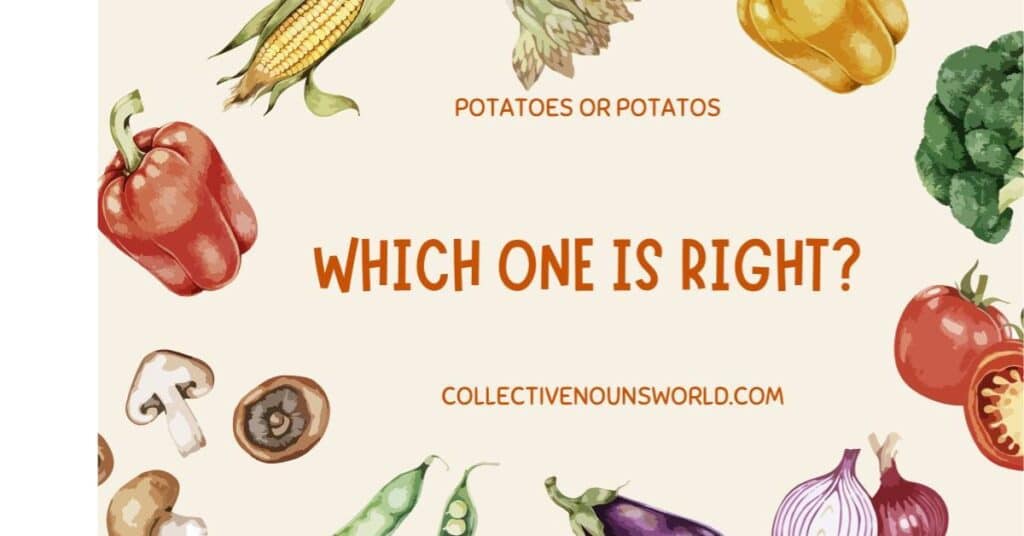English spelling and grammar can sometimes confuse even the most fluent speakers. One of the common puzzles is deciding between “potatoes” and “potatos.” This question not only tests your knowledge of singular and plural nouns, but it also highlights the quirks of English grammar rules. In this guide, we’ll explore the origins, correct usage, and spelling of both words while touching on related terms like tomatoes and tomatos. Let’s dive in to clear up the confusion!
Understanding the Confusion Between Potatoes and Potatos
The confusion between “potatoes” and “potatos” stems from several factors that blend historical quirks, regional accents, and modern-day influences. Spelling in the English language has evolved inconsistently, often leaving learners with puzzling exceptions. This inconsistency is amplified by the rules surrounding words ending in -o, where some take “-es” for the plural, while others just add “-s.” Coupled with widespread errors in casual writing, it’s no wonder that many people struggle to determine the correct spelling.
Why Is There Confusion?
One reason for the confusion lies in historical inconsistencies in English spelling. English has borrowed words like “potato” from other languages, such as Spanish (“patata”), adapting them to its own rules. However, unlike many borrowed words, those ending in “-o” follow unique pluralization patterns. In this case, “potato” adds “-es” to become “potatoes,” which might not be intuitive for learners who expect a simpler “-s” addition.
Another factor is the influence of regional accents and non-standard spellings. In spoken English, the distinction between “potatoes” and “potatos” can be subtle, especially with different dialects pronouncing vowels differently. This phonetic ambiguity can lead to spelling mistakes, particularly among individuals unfamiliar with English’s irregular plural rules.
Common Misconceptions About Spelling
A prevalent misconception is the belief that both “potatoes” and “potatos” are correct. While many people assume “potatos” is simply an alternative spelling, only “potatoes” aligns with standard grammar rules. This error often arises from casual contexts where precision isn’t emphasized, leading to widespread reinforcement of the incorrect form.
Modern tools like autocorrect and spellcheckers can also contribute to mistakes. While they are generally helpful, these tools sometimes fail to catch nuanced errors or may even suggest incorrect spellings based on prior user behavior. For example, if a writer frequently types “potatos” incorrectly, their device might begin to “learn” and accept the misspelling, perpetuating the confusion.
You may also like: IHH Meaning in Text: Simple Guide & Examples
What Are Potatoes?
Potatoes are one of the most widely consumed and versatile foods in the world. They are starchy tubers that belong to the botanical family Solanaceae, commonly referred to as the nightshade family. Originating in the Andean region of South America, potatoes were cultivated as early as 8,000 years ago. Over time, they have become a global staple, serving as a primary source of carbohydrates in diets across cultures. Potatoes come in many varieties, including russet, red, yellow, and fingerling, each suited for different types of cooking like boiling, baking, frying, or mashing.
Botanically, the potato plant (Solanum tuberosum) grows underground tubers, which store energy for the plant. These tubers are the edible part that we commonly refer to as “potatoes.” Their widespread use, nutritional value, and adaptability make them an indispensable crop worldwide.
Definition and Meaning of Potatoes
Potatoes, in simple terms, are the plural form of “potato.” The term is used to describe more than one of these tubers. For example, while “potato” refers to a single tuber, “potatoes” refers to multiple. This distinction is important because of English grammar rules regarding pluralization. Specifically, words like “potato” that end in “-o” typically take “-es” in their plural form.
As a food, potatoes are prized for their versatility. They can be baked, boiled, fried, or roasted, making them a key ingredient in recipes ranging from French fries to hearty stews. Beyond culinary applications, potatoes hold cultural significance, featuring in festivals, sayings, and historical accounts like the Irish Potato Famine.
Correct Usage of Potatoes
The plural form “potatoes” is used when referring to multiple tubers. It is typically employed in contexts where quantity is emphasized or when discussing potatoes as a category of food. For instance, you might say, “We need potatoes for the soup” or “Potatoes are rich in vitamin C and potassium.” In contrast, “potato” would be used for singular references, such as “I’ll have a baked potato.”
In everyday contexts, potatoes often appear in shopping lists, recipes, and casual conversations. Knowing when to use the plural form helps avoid common mistakes, such as incorrectly writing “potatos” instead of “potatoes.”
Examples of Potatoes in Sentences
To clarify the correct usage, here are practical examples:
- “The farmer harvested sacks of potatoes from his field.”
- “I prefer roasted potatoes over mashed ones for dinner.”
- “Potatoes are a great source of energy and nutrients.”
- “She bought five large potatoes to make fries for the party.”
What Is Potatos?
The term “potatos” is a common misspelling of the plural word “potatoes.” While it might seem like a logical alternative, it is not considered correct in standard English. This misspelling often arises due to confusion about the pluralization rules for words ending in “-o.” Despite its frequent appearance in informal writing and on the internet, using “potatos” instead of “potatoes” is an error that can lead to misunderstandings, particularly in formal or professional contexts.
The correct pluralization of “potato” follows a specific English grammar rule: nouns ending in “-o” preceded by a consonant generally take “-es” in the plural form. This is why “potatoes,” not “potatos,” is correct.
Is the Word Potatos Correct?
No, the word “potatos” is not correct in standard English. It fails to follow the established grammar rules for plurals. English nouns that end in “-o” and are derived from foreign origins often add “-es” for pluralization. Words like “potato,” “tomato,” and “hero” follow this pattern, making “potatoes,” “tomatoes,” and “heroes” their proper plural forms.
The misspelling “potatos” can result from the assumption that all nouns ending in “-o” simply add an “-s.” While some words do (like “pianos” or “photos”), the majority, especially those borrowed from Spanish or Italian, require the “-es” pluralization.
Definition and Meaning of Potatos
The term “potatos” does not hold a formal place in the English language. It is an incorrect attempt to pluralize “potato” and is widely recognized as a spelling mistake. The confusion often arises from incomplete knowledge of pluralization rules in English or reliance on digital tools like autocorrect that may fail to catch such errors.
Additionally, the frequent use of “potatos” in casual writing, memes, and even media can perpetuate its perceived legitimacy. This highlights the importance of understanding the correct form “potatoes” to avoid reinforcing incorrect spelling habits.
Common Mistakes Involving Potatos
Using “potatos” instead of “potatoes” can create several issues in both communication and digital search results. Incorrect spelling can lead to misunderstandings in professional writing or educational materials. For example, someone writing a recipe with “potatos” may appear less credible or knowledgeable about the subject.
In the context of search engine optimization (SEO), misspellings like “potatos” can impact visibility. While search engines may suggest the correct term, they are less likely to rank content with frequent spelling errors, reducing its reach. For effective communication and better search performance, it is crucial to use the correct plural form: “potatoes.”
You may also like: Top 20 Jamaican Slang for Friend or Bro
Side-by-Side Comparison of Potatoes and Potatos
The debate between “potatoes” and “potatos” is easily clarified by understanding the grammar rules and spelling standards of the English language. These two forms stem from the pluralization of the singular noun “potato.” While one is grammatically correct, the other is a misspelling caused by misunderstandings of pluralization rules. By examining the differences, learners can confidently use the right term and avoid common errors in writing and speech.
Grammar Rules for Singular and Plural Forms
In English, pluralization often depends on specific patterns, especially for words ending in “-o.” For nouns like “potato,” which end in a consonant followed by “-o,” the correct rule is to add “-es” to form the plural. This gives us “potatoes” as the correct plural form. Similarly, other words like “tomato,” “hero,” and “echo” follow the same pattern, becoming “tomatoes,” “heroes,” and “echoes.”
The singular and plural noun rule here differs from exceptions like “photo” or “piano,” where an “-s” is added without “-es.” These exceptions occur because their usage evolved differently, often influenced by their origin languages. Thus, “potatoes” adheres to the English spelling exceptions that apply to borrowed words, aligning it with standard rules.
Spelling Differences Explained
The spelling difference between “potatoes” and “potatos” lies in how the plural form of “potato” conforms to established grammar conventions. Adding “-es” instead of just “-s” ensures that the plural form aligns with proper English spelling. Words like “potato” and “tomato” were influenced by Spanish origins, and their pluralization rules reflect this borrowing.
Choosing the correct spelling is not just about accuracy—it also improves communication and avoids potential misunderstandings. For example, in writing, “potatos” can confuse readers or appear unprofessional, especially in formal or academic settings. Understanding that words ending in “-o” often add “-es” for the plural helps writers avoid such errors and ensures clarity.
Here’s a quick table summarizing the differences:
| Singular Form | Correct Plural | Incorrect Plural |
| Potato | Potatoes | Potatos |
| Tomato | Tomatoes | Tomatos |
| Hero | Heroes | Heros |
You may also like: Anual or Annual: Which One’s Right? Correct Spelling Explained
The Plural Rule for Potato: Potatoes vs. Potatos
Understanding why “potatoes” is the correct plural form of “potato” requires a closer look at how English handles pluralization, especially for nouns ending in “-o.” The plural form “potatoes” follows the well-established rule for most words that end in a consonant followed by “-o.” This rule dictates that such words form their plural by adding “-es” instead of just “-s.” As a result, the proper plural of “potato” is “potatoes,” not “potatos.”
What Is the Plural Form of Potato?
The plural form of “potato” is “potatoes.” This follows standard English grammar rules for pluralizing nouns ending in “-o.” In English, when a word ends in a consonant plus “o,” the correct pluralization typically requires adding “-es.” This is seen in other examples like “tomato” becoming “tomatoes” and “hero” turning into “heroes.”
The reason why “potatoes” is the right choice over “potatos” is simple: it aligns with the grammatical structure used for these specific types of nouns. It reflects consistency in pluralization rules, ensuring clarity in both written and spoken communication.
Why Is It Potatoes and Not Potatos?
The reason “potatoes” is the correct plural form of “potato” comes from the linguistic history and evolution of the English language. English has borrowed many words from other languages, including Spanish and Italian, which have specific rules for pluralizing nouns. In these languages, words that end in “-o” often take an “-es” for their plural.
For instance, the word “tomato” also follows the same rule, becoming “tomatoes” in the plural form. This pattern was carried over into English, and as a result, the plural of “potato” became “potatoes”. The incorrect spelling “potatos” likely results from a misunderstanding of how to apply the pluralization rule for words ending in “-o.”
Grammar Insights and Usage Examples
To clarify the correct usage of “potatoes,” here are a few examples demonstrating the proper plural form:
- “I bought potatoes to make mashed potatoes for dinner.”
- “They harvested hundreds of potatoes from the garden.”
- “You can store potatoes in a cool, dark place for weeks.”
How Do You Spell Potato in Singular Form?
The singular form of “potatoes” is “potato.” It’s a simple word to spell, with no special rules or exceptions. When referring to one potato, you simply use “potato” as the correct singular form. In this case, there is no need to worry about pluralization, as “potato” clearly identifies a single item.
Understanding when to use “potato” versus “potatoes” is crucial for correct grammar. The singular form, “potato,” refers to one of these popular root vegetables. For example, you might say, “I need to peel a potato for the stew.”
Correct Singular and Plural Usage of Potato
Switching between the singular and plural forms of “potato” follows a clear set of grammar rules for plurals. When you’re talking about one potato, simply use “potato.” For example:
- “I want to eat a potato for dinner.”
When you’re referring to more than one, the plural form is “potatoes.” This is where the “-es” rule for pluralization comes into play. For example:
- “We have several potatoes left in the kitchen.”
You may also like: Usage or Useage: Quick Guide to Correct Usage
Examples and Daily Usage of Potatoes and Potatos
The correct spelling “potatoes” is widely used in everyday English, especially when referring to the plural form of the word “potato.” Whether you’re cooking, grocery shopping, or simply talking about food, “potatoes” is the word you should use in most contexts. It is common to hear or see phrases like, “I need to buy some potatoes for dinner tonight,” or “Do you want mashed potatoes or baked potatoes?” In both cases, the plural form, “potatoes,” correctly refers to more than one potato.
In casual conversations, recipes, or in grocery stores, “potatoes” is the word you’ll find in almost all scenarios involving more than one of these vegetables. When you’re talking about just one potato, however, you’ll use the singular form “potato.” For example: “I only need one potato for the recipe.”
Potatoes in Everyday English
The word “potatoes” is found everywhere in daily conversations, particularly when discussing food. It’s an essential item in many kitchens around the world, making it one of the most common words in food-related discussions. You might hear phrases like:
- “I love to eat potatoes with my dinner every night.”
- “There are so many ways to cook potatoes—baked, fried, or mashed.”
- “My grandmother grows potatoes in her garden.”
These examples highlight the frequent and correct usage of “potatoes” when referring to more than one of the vegetable. Whether you’re cooking at home, shopping for groceries, or chatting about food, using “potatoes” is the natural and correct choice.
Common Errors to Avoid When Using Potatoes or Potatos
One of the most common mistakes people make is spelling “potatoes” as “potatos.” This incorrect form often appears due to confusion about pluralization rules. Remember, the correct plural form of “potato” is “potatoes,” which follows the English rule for words ending in “-o,” like “tomato” (becoming “tomatoes”) and “hero” (becoming “heroes”).
The incorrect use of “potatos” can occur because of the natural tendency to add just “-s” instead of “-es” to pluralize words. To avoid this error, always remember to add “-es” when pluralizing words like potato and tomato.
Incorrect examples would be:
- “I need to buy some potatos.”
- “Do you have any potatos in the kitchen?”
You may also like: tryed or tried? Get the Right Answer Fast!
Learn Similar Words and Avoid Misspellings
When learning how to correctly spell “potatoes,” it’s helpful to look at other similar words that follow the same pluralization rules. One of the most commonly confused words is “tomato.” Both “potato” and “tomato” follow the same pattern for pluralization in English. By understanding this pattern, it becomes easier to remember the correct form for each word and avoid common mistakes.
English grammar can be tricky, but by recognizing shared rules, you can confidently handle pluralization and spelling. For example, “potatoes” and “tomatoes” both add “-es” in the plural form, which makes them easy to remember together. Let’s dive deeper into this rule to make sure you never confuse “potatoes” with “potatos.”
Tomatoes vs. Tomatos: A Comparative View
Just like “potatoes,” the word “tomato” also follows the same pluralization rule. The correct plural form is “tomatoes,” not “tomatos.” The confusion between “tomatoes” and “tomatos” often arises because English speakers tend to forget about the “-es” addition for words ending in “-o.”
The similarity between “potato” and “tomato” lies in their shared pluralization pattern. In both cases, you add “-es” instead of just “-s” to form the plural. Therefore, when you are dealing with the plural of “tomato,” remember it follows the same rule as “potato,” and you should write “tomatoes” instead of “tomatos.”
Plural Forms of Words Like Potato and Tomato
The plural forms of both “potato” and “tomato” are created by adding “-es” at the end, turning them into “potatoes” and “tomatoes.” This is an essential grammar rule for English words that end in “-o,” and it is consistently applied to ensure accuracy in both spelling and pronunciation.
Other words in English that follow the same pattern include “hero” (plural “heroes”) and “echo” (plural “echoes”). Understanding that these words share the same pluralization rule can help you apply it correctly in various situations.
Tricks to Master Spelling and Usage
To avoid making mistakes with words like “potatoes” and “tomatoes,” there are some simple memory tricks you can use. One easy method is to remember the “-es” rule when the word ends with an “-o.” A good mnemonic could be: “When it ends in -o, add -es for the plural.”
Additionally, when in doubt, you can always double-check words using reliable resources like dictionaries or grammar websites. Another helpful tip is to pay attention to the context of the sentence. For example, if you’re talking about more than one potato or tomato, it’s likely that “-es” is the correct ending. By practicing these strategies and applying the rules consistently, you’ll avoid errors like confusing “potatoes” with “potatos.”
You may also like: Cart vs Kart: Simple Guide to Choosing the Correct Spelling
Tips and Tricks for Mastering the Correct Spelling
Mastering the correct spelling of “potatoes” can be easy when you use a few practical tips and tricks. A simple method is to associate the “-es” ending with similar words, such as “tomatoes” or “heroes.” These words follow the same rule for pluralization, making it easier to remember. Also, “potatoes” has two syllables, and breaking it down as “pot-a-toes” can help you visualize the word more clearly when spelling it. By repeating these methods, you’ll start naturally remembering the correct form.
Another helpful tip is to practice spelling “potatoes” aloud or write it down multiple times until it becomes familiar. You can even use the word in different sentences to help reinforce its correct spelling. It may sound simple, but repetition is a powerful tool for mastering spelling, especially for tricky words like “potatoes.”
Easy Ways to Remember “Potatoes”
To remember how to spell “potatoes” correctly, you can use mnemonic devices. One of the most effective ways to do this is by creating a small story or phrase that connects to the word. For example, “The pot in potatoes makes it a big meal for many people.” This gives you a clear mental image of “potatoes” and the letters within the word. Associating the word with something familiar, like the “pot” used in cooking, can help you recall the correct spelling faster.
Another simple mnemonic could be: “Potatoes have an ‘es’ ending, like ‘tomatoes’ or ‘heroes.’” By linking “potatoes” to these similar words, you’ll remember that the plural form always ends in “-es”. These tricks will make spelling “potatoes” feel less challenging.
Exercises and Quizzes for Practice
Testing your knowledge through exercises and quizzes is a fun and effective way to master the correct spelling of “potatoes.” One helpful exercise could be to write out a list of sentences using the word “potatoes” in both singular and plural forms. For example, “I need to buy potatoes for dinner,” versus “I only have one potato left.” This reinforces the difference between the singular and plural forms.
You can also challenge yourself with online spelling quizzes that focus on tricky words like “potatoes.” Many grammar websites and apps offer free quizzes designed to test your knowledge of spelling rules. By regularly taking these quizzes, you’ll sharpen your spelling skills and become more confident when writing. The more you practice, the easier it will be to avoid misspellings like “potatos.”
You may also like :Discover the Meaning of “Iicyify” in Urban Dictionary
Origins and Etymology of Potatoes and Potatos
The word “potatoes” has an interesting and long history, stretching back to the ancient civilizations in the Americas. The potato itself originated in the Andean region of South America, where the indigenous people grew and consumed it for thousands of years. When Spanish explorers came into contact with the potato, they brought it back to Europe in the 16th century, where it quickly became a staple crop. The word “potato” itself is believed to come from the Spanish term “patata,” which in turn comes from the indigenous Taíno word “batata” for sweet potato.
Over time, as the potato spread across the globe, different regions and languages adopted and adapted the word. In English, the plural form “potatoes” emerged with the common rule of adding “-es” to words ending in “-o.” However, the misspelling “potatos” has also been in use due to a misunderstanding of this rule, and it’s become a common mistake. Tracing the word’s journey through history helps us understand how different spellings can emerge, even when they don’t follow the standard grammar rules of English.
Why Spelling Matters
Proper spelling plays a crucial role in effective communication. When you spell “potatoes” correctly, it not only ensures clarity but also enhances your credibility. Misspellings like “potatos” can lead to confusion and even undermine the professionalism of your writing. For example, in academic writing, business documents, or even casual communication, proper spelling demonstrates attention to detail and a good grasp of language rules.
In a world where written communication is often the primary form of interaction, correct spelling is more important than ever. For instance, spelling mistakes can distort the meaning of a message and make it more difficult for others to understand. This is especially true with words like “potatoes,” where a simple error such as “potatos” can lead to unnecessary misunderstandings. By mastering the correct spelling of words, you ensure that your communication is as effective and credible as possible.
Synonyms and Related Words for Potatoes
While “potatoes” is the most commonly used term, there are a few other words and phrases that can be used in specific contexts, though these are less frequent. Understanding these synonyms can add variety to your writing, but it’s important to use them appropriately.
Other Words for Potatoes and Their Usage
One synonym for “potatoes” is “spuds.” This informal term is commonly used in casual conversations, especially in the UK and parts of the US. For example, people may say, “Let’s have some spuds with our dinner,” instead of “Let’s have some potatoes.” It’s a more relaxed, colloquial way of referring to potatoes, making it ideal for informal settings.
Another word you might come across is “tubers.” While “tubers” technically refers to the entire family of plants that include potatoes, yams, and sweet potatoes, it’s also used to refer to potatoes in scientific or agricultural contexts. For example, “Potatoes are tubers that grow underground,” would be a suitable use of this word in educational writing or agricultural discussions.
In some cases, people also use “yukon golds” or “russets” to refer to specific varieties of potatoes, though these are technically not synonyms for the general term “potatoes.” However, when you’re talking about a specific type of potato, using its variety name adds clarity and precision. For instance, “We’re having Yukon Gold potatoes for dinner” tells you about the specific variety of potato being served.
Quick Summary and Final Tips
In this article, we’ve explored the correct usage of “potatoes” and the common misspelling “potatos.” While “potatoes” is the standard and grammatically correct plural form, “potatos” is a frequent error that stems from misunderstanding English pluralization rules. Understanding these rules and the history behind the words helps us recognize why “potatoes” is preferred. We also touched on the importance of spelling in communication, offering tips to avoid common mistakes.
Side-by-Side Comparison of Key Differences
Here’s a recap of the key differences between “potatoes” and “potatos”:
- “Potatoes” is the correct plural form of “potato”, following the standard rule for words ending in “-o”, where “-es” is added for the plural.
- “Potatos” is an incorrect form and often seen as a misspelling due to confusion with other words that form plurals by simply adding “-s”.
Final Notes on Correct Usage
To sum up, remember that “potatoes” is the grammatically correct way to refer to more than one potato. “Potatos” is a common but incorrect misspelling. When in doubt, think of other similar words like “tomatoes” and use the same “-es” rule for the plural form. Repeating the correct spelling through writing or speaking will help cement it in your memory. With a little practice, spelling “potatoes” will become second nature, and you’ll avoid the mistake of using “potatos.”
FAQs
Is it potato or potato?
It’s “potato” in singular form; the plural is “potatoes.”
Is there an E in potatoes?
Yes, the plural of potato is spelled “potatoes” with an E.
Is a potato countable or not?
Potato is countable; you can say “one potato” or “many potatoes.”
What is correct, potatos or potatoes?
“Potatoes” is correct; “potatos” is a misspelling.
Is it spelled potato or potatoe?
The correct spelling is “potato”; “potatoe” is incorrect.
What is the plural rule of potato?
The plural of “potato” is formed by adding “-es,” making it “potatoes.”
Conclusion
“potatoes” is the correct plural form, while “potatos” is an incorrect spelling. Understanding English grammar rules helps avoid this common mistake. By remembering that words ending in “-o” often use “-es” for plural, you can easily get it right.
Correct spelling is important for clear communication and credibility. By practicing and staying mindful of the difference, you’ll always use “potatoes” correctly. Keep these tips in mind, and spelling will be easier than ever!

Luna Jasper is an experienced blogger with a passion for language and grammar. At **Collective Nouns World**, she shares her expertise in exploring the fascinating world of collective nouns, making learning both engaging and fun. With years of writing and research under her belt, Luna’s insightful articles help readers understand and appreciate the English language.







